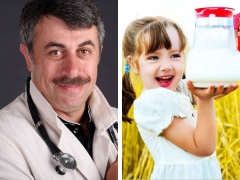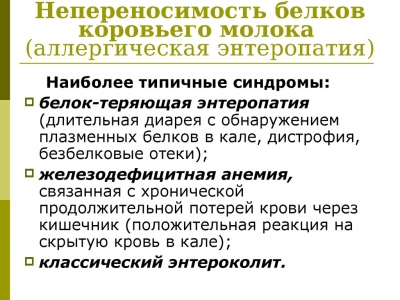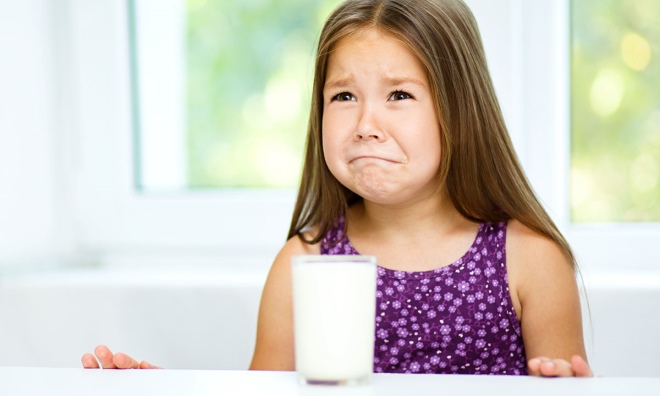Dr. Komarovsky about milk
Many parents believe that milk is incredibly useful for children. In it and calcium, and bacteria useful for digestion. Naturally, from an early age a child begins to be taught to drink and eat dairy products, even if the toddler desperately resists and shows with all appearances that he does not like them. Whether it is necessary to insist and whether milk is useful, as is commonly believed, says a well-known pediatrician Evgeny Komarovsky.
Good for children and bad for adults.
In order for milk sugar (lactose) to be absorbed in the body, a special enzyme is produced - lactase. In newborns, the lactase level is very high, it is produced a lot, since breast milk is the only food of the crumbs. As they grow older, the amount of lactase produced decreases, and in the adult this enzyme is practically absent in the body, since it no longer needs biologically dairy food. But the adult organism quite normally accepts and digests fermented milk products.
In some people, a decrease in the lactase level begins at the age of 3, in others, at the age of 10, and in a third, at a later time. This is an individual feature of the body and there are no norms in this matter in principle.
If nature has provided for the child the opportunity to eat milk, this does not mean that you need to eat the milk of farm animals. Nature made sure that the baby absorbed the mother's milk well, and not goat or cow.
Benefit and harm
Milk of cows and goats for children of the first year of life is not just harmful, but dangerous, says Yevgeny Komarovsky. But this fact is rather difficult to explain to parents, who from their childhood remembered the statements that milk is a source of health and energy for a growing organism. It is very difficult to explain to parents that in the absence or shortage of breast milk in a nursing mother it is best to choose an adapted milk formula.
Firstly, it is important in terms of composition. There is vitamin D in the mix, which prevents development. rickets. But if you feed your child with cow's milk and give separately preparations of vitamin D, then rickets develops very often. And this can be explained by the processes that occur in the body after a child eats cow's milk.
In the composition of cow's milk more calcium, than in breast milk, almost 4 times. The phosphorus content exceeds the analogous parameter of breast milk 3 times. Such amounts of phosphorus and calcium are needed by a calf in order for his bones to grow faster. However, the rapid growth of bones for a human infant is not the most preferred developmental option.
In addition, excess amounts of calcium and phosphorus that enter the intestines of a child cannot be completely absorbed. The body will take only the amount he needs, the rest will be released with feces.
With phosphorus other story. His body takes not as much as necessary for normal life, but about one third of the amount received. Thus, the use of cow's milk leads to an overdose of phosphorus. The kidneys of the child react to the high content of this substance, and they begin to quickly remove excess phosphorus from the body. Unfortunately, it goes along with the obtained calcium, which is so important for the harmonious development of the crumbs.
The kidneys are ripening closer to one year old, at about the same time you can start giving milk to the baby, gradually introducing it to the diet.
It is not necessary to give a child a gallant of liters, it is quite enough to give a one-year-old child about half a glass of milk a day, a two-year-old - 1 glass, and a two-year-old toddler - no more than 2 glasses a day. By the age of 3, all restrictions are no longer relevant, and children can be given this product, even if cow, even goat, in any quantity that he is able and willing to “master”.
Another not the most "useful" aspect is the intolerance of cow protein, which occurs in children of the first years of life quite often. It is manifested in the impossibility of assimilating protein, which the organism of the crumbs regards as alien. Immunity is activated, an allergic reaction begins. If you have such a child, do not give him any milk. Only adapted mixtures are suitable, preferably hypoallergenic, in which milk protein is processed in a special way and neutralized.
In recent years, cows and goats also eat little natural food, and many of the food that the owners give them contains hormones and antibiotics. Naturally, this whole set goes in certain quantities into the milk produced. This is another reason not to give this product to children up to a year, although the final decision rests with the parents. Indeed, it is rather difficult to dispute the fact that without milk it is rather difficult to provide a varied diet for a child.
Mix or milk?
If after 12 months a decision has been made to introduce whole milk in the feed, Yevgeny Komarovsky advises to make an informed decision. This product in metered quantities will not cause harm, but the baby’s adapted milk formula, in which the amount of phosphorus is reduced, and of calcium and vitamin D is increased, will be more beneficial.
The amount of iron in cow's milk is insufficient, and its regular use will lead to anemia. In adapted mixtures, this composition parameter is provided, and the child will receive the amount of iron he needs.
If the family budget allows, it is better to choose a mixture that corresponds to the age - from 12 months. Usually such mixtures are designated by manufacturers as “3”.
Fat or skim?
Today, the food industry offers a lot of options for skim milk. It is considered preferable for adults and children who do not tolerate fat cow's milk. However, in the very concept of "fat free", according to Yevgeny Komarovsky, lies the catch.
The fact is that vitamins A and D, which are contained in milk, can dissolve only in fats. If milk is defatted, then these vitamins will not be there. And so you shouldn’t believe marketers who promise skimmed baby milk with vitamin D in advertising.
Baby milk is different from the usual ultra-pasteurization. The percentage of fat in it is reduced, but is not at the minimum mark. The box usually indicates the age at which manufacturers recommend the product. Most often it is 8 months. Komarovsky urges to give such milk, if the mother really wants to do it, no more than once a day and in small quantities.
After a year, babies can dilute regular milk with 3% fat with normal water to about one third of the volume.
Dairy products
Dairy products are useful, and they can be administered to children from about 6 months. The main thing, says Yevgeny Komarovsky, is not to give kefirchiki and curds in the heat, because with them you can feed your child in hot weather and a fair amount of E. coli. It is also important to know the measure - do not give water to the karapuz six times a day with kefir alone, because there will be no benefit from such complementary foods.
Fermented milk products should be given to children no more than once a day, it is desirable that they were not produced in factories that produce fashionable and advertised yoghurts, but at special baby food plants. The shelf life of a good baby kefir - no more than a day. It should not contain any sweeteners, dyes or strawberry and banana flavors.
It is very good if mother learns how to make homemade dairy products for her offspring. For them, you can use regular store milk with a fat content of not more than 1.5%.
Complementary food in the form of fermented milk products is not very desirable for children with impaired mineral metabolism, with signs of rickets. Therefore, before the introduction of such foods it is advisable to consult with a pediatrician.
Boil milk?
Pasteurized milk, which is sold in any store, does not need additional boiling, says Yevgeny Komarovsky. But if the product is purchased on the market, from grandmothers who keep cows or goats on their farm, then it is imperative to boil it.
If you buy a product from a neighbor, which you know well, and you know the cow personally, the milk, which is no more than 2 hours old, should not be boiled. It has a large number of beneficial bacteria, whose content is noticeably reduced after a couple of hours after milking.
When boiling destroyed some vitamins and microbes that may be in milk. But proteins, fats and carbohydrates are stored in full, so that parents may not worry about the energy content of the drink.
If the baby refuses milk
If the crumbly flatly refuses kefir, cottage cheese and milk, you shouldn’t force him to use these products at any price, says Yevgeny Komarovsky. The benefits of the dairy diet are somewhat exaggerated, and there is not a single substance, trace element, vitamin, mineral that could not be given to a child with other foods. Everything is interchangeable. Do not drink milk - you can give ice cream, children usually never refuse from it. Do not eat ice cream - you can give more fruits and vegetables, meat, fish.
The main rule, according to Komarovsky, is as follows: milk, which was “shoved” into a child by force or blackmail, will never bring him benefit and be worse assimilated.
For more information about the dangers and benefits of milk, Dr. Komarovsky will tell in his program.
































